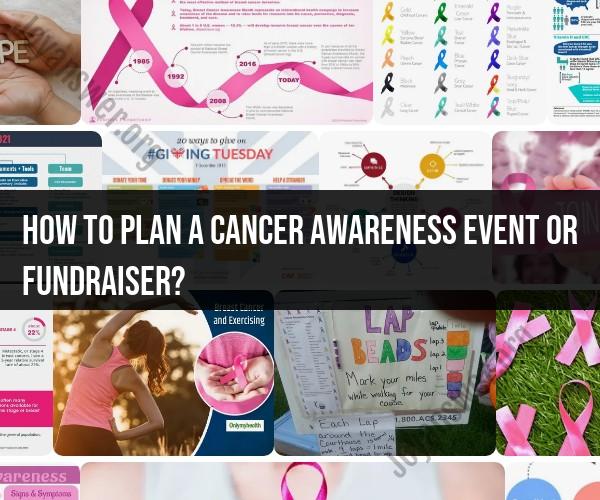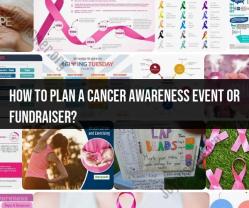How to plan a cancer awareness event or fundraiser?
Planning a cancer awareness event or fundraiser involves several key steps and considerations to ensure its success. Here's a step-by-step guide and some ideas to help you get started:
Define Your Purpose and Goals:
- Determine the specific purpose and objectives of your event. Are you raising awareness for a particular type of cancer? Are you fundraising for research, patient support, or awareness campaigns?
Choose a Cancer Type or Theme:
- Select a cancer type or theme to focus your event. You can choose to raise awareness for a specific cancer, such as breast cancer or childhood cancer, or have a broader cancer awareness theme.
Set a Date and Location:
- Choose a date and location for your event. Consider factors like the availability of attendees, the weather (if it's an outdoor event), and accessibility for participants.
Create a Budget:
- Estimate the costs associated with your event, including venue rental, permits, promotional materials, catering, and entertainment. Determine how you will cover these expenses and allocate funds to your cause.
Fundraising Strategies:
- Decide on your fundraising strategies. Will you collect donations, sell tickets, host a silent auction, or organize a charity run/walk? Consider multiple revenue streams to maximize your fundraising efforts.
Promote Your Event:
- Develop a marketing and promotion plan to reach your target audience. Use social media, email campaigns, flyers, posters, and local media to spread the word about your event.
Secure Sponsorships:
- Seek sponsors or partners who can provide financial support, in-kind donations, or services for your event. Local businesses, corporations, and healthcare organizations may be interested in supporting cancer awareness initiatives.
Plan the Program and Activities:
- Outline the event's program, including guest speakers, presentations, entertainment, and any activities that align with your goals. Consider incorporating survivor testimonials or expert speakers to educate attendees.
Ensure Participant Engagement:
- Make your event interactive and engaging. Offer educational booths, health screenings, workshops, and activities that encourage attendees to learn more about cancer prevention and early detection.
Secure Necessary Permits and Insurance:
- Depending on the size and nature of your event, you may need permits, insurance, and approvals from local authorities. Ensure you comply with all legal requirements.
Coordinate Volunteers:
- Recruit and train volunteers to assist with various aspects of the event, such as registration, logistics, and participant engagement. Volunteers can help make your event run smoothly.
Safety and Health Precautions:
- Consider health and safety precautions, especially if your event involves physical activities. Have first aid supplies on hand, provide ample water, and ensure participants are aware of any health risks.
Evaluate and Recognize Contributors:
- After your event, evaluate its success by analyzing attendance, funds raised, and feedback from participants. Thank sponsors, donors, and volunteers for their contributions.
Follow Up and Reporting:
- Continue to engage with your supporters after the event. Share updates on how the funds are being used, report on the impact of your event, and express gratitude to all involved.
Plan for Future Initiatives:
- Consider turning your awareness event into an annual tradition or explore additional cancer awareness initiatives to maintain momentum and make a lasting impact.
Remember that cancer awareness events and fundraisers can vary in size and scale, so tailor your planning efforts to match your resources and goals. Collaboration with local cancer support organizations, hospitals, and cancer survivors can also enhance the impact of your event.
Raising Awareness: Planning a Cancer Awareness Event or Fundraiser
Planning a cancer awareness event or fundraiser is a great way to raise awareness about cancer, show support for those affected by the disease, and raise money for cancer research. Here are some steps to help you plan a successful event:
- Choose a cause. What type of cancer do you want to raise awareness for? What organization do you want to support? Once you have chosen a cause, you can start planning your event.
- Set a budget. How much money do you want to raise? How much money do you need to raise to cover the costs of your event?
- Choose a date and time. When do you want to hold your event? What time of day will work best for your target audience?
- Find a location. Where do you want to hold your event? Consider factors such as size, cost, and availability.
- Promote your event. Spread the word about your event through social media, flyers, and posters. You can also contact local media outlets to see if they are interested in covering your event.
- Organize your event. Make sure you have all of the necessary supplies and volunteers. Create a timeline for your event and have a backup plan in case of bad weather.
Making a Difference: Steps to Organize a Successful Cancer Awareness Campaign
Organizing a successful cancer awareness campaign takes planning and effort, but it is well worth it. Here are some steps to help you get started:
- Set goals. What do you want to achieve with your campaign? Do you want to raise awareness about a specific type of cancer? Do you want to educate people about the signs and symptoms of cancer? Once you know your goals, you can start developing your campaign strategy.
- Choose a target audience. Who do you want to reach with your campaign? Are you targeting cancer patients and survivors? Are you targeting the general public? Once you know your target audience, you can tailor your messaging and outreach efforts accordingly.
- Develop a message. What do you want to say with your campaign? What message do you want to leave with your target audience? Your message should be clear, concise, and easy to understand.
- Choose your channels. How will you reach your target audience? Will you use social media, print materials, or in-person events? Choose the channels that will be most effective in reaching your target audience.
- Create a budget. How much money do you need to implement your campaign? Your budget will determine the scope and scale of your campaign.
- Evaluate your results. Once your campaign is over, it is important to evaluate your results. This will help you to learn from your successes and failures, and to improve your future campaigns.
Promoting Cancer Awareness: Strategies for Hosting a Fundraising Event
Hosting a fundraising event is a great way to raise money for cancer research and awareness. Here are some strategies for hosting a successful event:
- Choose a unique event concept. What will make your event stand out from the crowd? Choose an event concept that is relevant to your target audience and that is likely to generate interest.
- Promote your event early and often. Start promoting your event well in advance so that people have time to mark their calendars and make plans to attend. Use a variety of promotional channels to reach your target audience.
- Set realistic fundraising goals. How much money do you hope to raise with your event? Set realistic goals that you can achieve.
- Recruit volunteers. Volunteers are essential to the success of any fundraising event. Recruit volunteers from your community, your network, and your local cancer organization.
- Thank your donors and supporters. After your event, be sure to thank your donors and supporters for their generosity. You can do this through social media, email, or handwritten notes.
By following these tips, you can plan and host a successful cancer awareness event or fundraiser.






